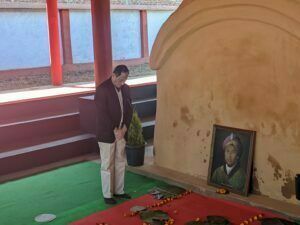An emotional Meghen paid floral tributes to the statue and tomb of Maharaj Gambhir Singh at Canchipur, Imphal, on his 188th death anniversary.
TFM Report
Former chief of the proscribed United National Liberation Front (UNLF) RK Meghen on Sunday said that although Manipur became a part of independent India, the people of the state are not “breathing the air of freedom”, as there is a serious doubt on the survivability of the indigenous people of the state with their identity.
Meghen was speaking to media persons after paying floral tributes to the statue and tomb of Maharaj Gambhir Singh at Canchipur, Imphal, on his 188th death anniversary.
Replying to a query, he said that although there is a facade of development, the maximum populace of the state belongs to the economically weaker section.
Merely declaring independence is not enough, he said while adding that the people should be able to live peacefully and prosper. “And in our context, the people should be able to live with our identity’s dignity and pride”, he said. At present, these have not been fulfilled and added that the decision taken by the new generation will be crucial.
Casting serious doubts on the consequences of connecting the state with the rest of the country through railway, he maintained that it will compound the already existing problem of migrant population influx in the state.
Meghen further said that January 9 is an important day in the history of Manipur as on this day in 1934, the British and Burmese rulers reached an agreement without the consent of Maharaj Gambhir Singh to lease Kabow valley to the Burmese.

A decision on 22,210 square kilometres of Manipur’s land was taken without the consent of the King of Manipur. This was the beginning outsiders interfering in the affairs of Manipur, he added.
Between 1947-49, the British used to transfer 500 gold coins per month to Manipur. The Government of India used to continue it till 1953, he said. But in 1953, Prime Minister Jawaharlal Nehru and Burmese Premier U Nu reached an agreement to give away Kabow valley leased to Burma after Nehru persuaded the then Maharaja of Manipur, Bodhchandra. It is not known whether the parliament of India ratified the agreement or not. The obscurity persists till today, Meghen said,
Stating that he was happy and emotional at the same time to be able to pay homage to the forefathers, Meghen maintained that the new generation should know the history and the sacrifices made by their forefathers for the motherland.
